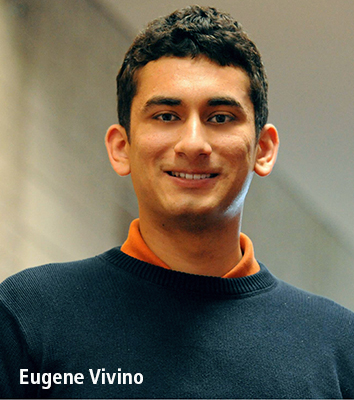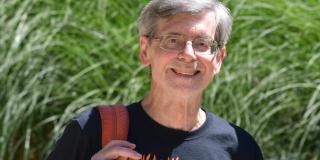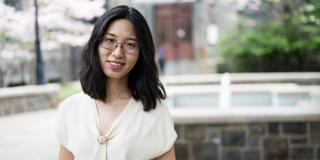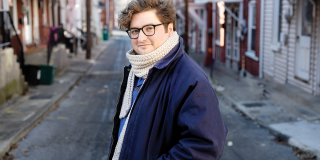Theater. A field of study whose acknowledgement is often lost amid Lehigh’s popular majors, like mechanical engineering, accounting or computer science that dominate academic life. Its absence from most of the student body conversation can lead to a common misconception that theater is an area separate from and irrelevant to other subjects.
Lehigh students from all walks of academic life participate in theater courses and production. Students at Lehigh are often active in theater while pursuing a major in another discipline. For students Eugene Vivino and Jane Mousseau, minoring in theater has defined their careers at Lehigh and complemented their primary subjects.
 Sound design is Vivino’s strongest passion. A freshman when he walked into Sound Technology and Production I in the fall of 2012, he discovered it was an interest that he wanted to pursue and he declared a theater minor. Scheduled to graduate this coming May, Vivino is working as a sound designer for the theater department’s March production of BOOM. He is responsible for engineering sound effects, composing underscore music to reflect emotions throughout the show and choosing speaker placement to cast different sounds from different areas of the theater. His goal is to make the audience feel like they are part of the play itself.
Sound design is Vivino’s strongest passion. A freshman when he walked into Sound Technology and Production I in the fall of 2012, he discovered it was an interest that he wanted to pursue and he declared a theater minor. Scheduled to graduate this coming May, Vivino is working as a sound designer for the theater department’s March production of BOOM. He is responsible for engineering sound effects, composing underscore music to reflect emotions throughout the show and choosing speaker placement to cast different sounds from different areas of the theater. His goal is to make the audience feel like they are part of the play itself.
For Mousseau, bringing the audience into the play is done one stitch at a time. As one of the show’s costume designers, she is responsible for designing a wardrobe that best reflects the themes of the play and the personalities of its characters, whether through buying or sewing costumes.
Mousseau is a journalism major, but she spends more time on her two minors—theater and graphic design. While her minors are more relevant to her work as a costume designer, her journalism classes have improved her ability to analyze texts, which leads to a better understanding of how to approach the design process.
“When you can understand what the play is about, it helps you in the design process because you have an idea of how to express the purpose of the play,” she says.
But the blending of these disciplines has had the most impact on her role in the theater. The process is more integrated than people think it is, she says. Success in the field actually requires experience in several different areas.
“Everything is intertwined,” Mousseau says. “You see how well it works when everyone does their share of work and it all comes together. And we’re all using at least one skill that probably has nothing to do with theater.”
Vivino’s major lies at the other end of the disciplinary spectrum. His main academic focus is earth and environmental sciences, a subject that he says usually confuses people who know of his involvement in Lehigh productions. Like Mousseau, his response is that all fields of study are, in fact, pertinent for the process.

“It’s not as complicated as people think it is,” he says. “Everything is interconnected to reality.”
The relation between Vivino’s fields is a bit harder to discern from that of Mousseau. Yet he says the combination is the perfect fit, allowing him to use his technological mind to find ways to express himself. He says the material he has studied in EES has allowed him to make a greater contribution to his work in the theater. For Vivino, both art and science reinforce each other.
“I’m learning about the world through a scientific and artistic perspective, which helps me to be more creative,” he says.
Vivino often draws inspiration from his coursework in the sciences. He says that studying the earth over millions of years has made him more connected to the world around him. This has broadened his perspective and allows him to see life experiences from different angles.
“It adds a new dimension to theater. It gives me more ideas on what situations I can create in order to express myself,” he says.
Both Vivino and Mousseau say their coursework has led them to self-awareness. By studying two fields of interest, Vivino has become more in-touch with his own curiosities and has a better idea of what he would like to pursue as a career.
“If one thing makes you more of who you are then you’re going to be more of who you are when you’re doing something else,” he says. “The more you know who you are, the more you know what you like and what you’re good at. So then you can find something that you really love to do and you’ll be able to put forward your best work.”
For Mousseau, her experience has introduced her to a talent she didn’t know she possessed. She says this factor has shaped her college experience the most.
“I started doing it because I thought it was cool,” Mousseau says. “And then I find out that I’m actually pretty good at it. So I’m using this skill that I didn’t even know I had.”
As Vivino and Mousseau prepare for BOOM, they are becoming more versed in the production process. The skills gained from interdisciplinary studies allow them to work in an otherwise nonexistent realm. The result is a colorful combination of imagination and reality, Vivino says.
-Abby Johnson '16






